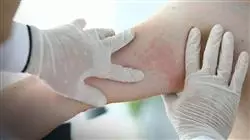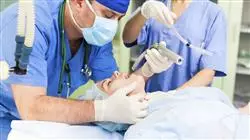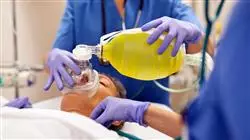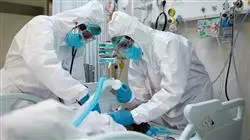University certificate
The world's largest faculty of nursing”
Description
Describe the epidemiology, etiology and repercussions of acute poisonings in the pediatric and neonatal age in order to be able to perform a quality praxis”

The field of knowledge covered by toxicology is very wide, almost as wide as the different ways in which a person can be poisoned by different products, animals and plants. It is estimated that accidents that occur due to domestic cleaning represent one of the first causes of consultations to the Toxicological Information Service. On the other hand, and although less frequently, the ingestion of poisonous plants has less impact than the first case, even so, the probabilities of receiving a patient in these conditions are never zero.
For this reason, it is important to have a solid knowledge in this type of emergencies, since this way, the correct diagnosis and treatment is guaranteed. Therefore, this program was developed to provide nurses with sufficient knowledge in human toxicology to be able to successfully address the professional challenge of caring for patients with urgent toxicological problems.
The contents of this program are structured in large groups of topics with a pedagogical coherence. In this way, the student will be able to understand the proper way to perform an evaluation of a poisoned patient, explain the life support process and apply preventive techniques to perform a gastrointestinal absorption.
Furthermore, it is a 100% online Postgraduate Certificate that provides students with comfortable study and ease, wherever and whenever they want it. Students will only need a device with Internet access to take their career one step further. A modality according to the current times with all the guarantees to position the engineer in a highly demanded sector.
Identify products that may pose a risk of poisoning to both the mother and the newborn during breastfeeding”
This postgraduate diploma in Toxicological Emergencies by Frequently Used Products, Animals and Plants for Nursing contains the most complete and up-to-date scientific program on the market. The most important features include:
- The development of clinical cases presented by toxicology experts
- The graphic, schematic, and practical contents with which they are created provide scientific and practical information on the disciplines that are essential for professional practice
- Practical exercises where the self-assessment process can be carried out to improve learning
- Clinical and diagnostic imaging and testing iconography
- An algorithm-based interactive learning system for decision-making in the clinical situations presented throughout the course
- Its special emphasis on toxicology research methodologies
- Theoretical lessons, questions to the expert, debate forums on controversial topics, and individual reflection assignments
- The availability of access to the contents from any fixed or portable device with Internet connection
Describe the ECG alterations in poisonings that produce cardiac involvement through this program”
The program includes, in its teaching staff, professionals from the sector who bring to this program the experience of their work, in addition to recognized specialists from prestigious reference societies and universities.
The multimedia content, developed with the latest educational technology, will provide professionals with situated and contextual learning, i.e., a simulated environment that will provide immersive training, designed for training oneself in real situations.
The design of this program focuses on Problem-Based Learning, in which the professional will have to try to solve the different professional practice situations that will arise throughout the academic course. For this purpose, the student will be assisted by an innovative interactive video system created by renowned and experienced experts.
Take the opportunity to explain the hematological involvement that occurs in acute poisonings"

Identification those toxics that cause hepatic affectation and their repercussion at the organic level"
Objectives
The main objective of the program is the development of theoretical and practical learning of nursing personnel when attending a toxicological emergency caused by frequently used products, animals or plants. In this way, the student will have the certainty of complying with the diagnosis and treatment protocol in an optimal manner. Therefore, at the end of the modules, the nurse will be fully trained to intervene in these cases with greater guarantees of success.

Identify the toxicokinetics of paracetamol and its treatment in case of acute poisoning with the use of the latest educational technology, in order to contribute with quality and safety to decision making”
General Objectives
- Define the basic and general principles of care for the severely poisoned patient
- Identify the main toxics available in our environment
- Describe the main signs and symptoms related to severe acute poisoning and its organ involvement
- Implement mechanisms to protect the severely poisoned patients and those around them
- Detect complications related to the related toxicant or to the patient's health status
- Explain the process of care, diagnosis and treatment of the severely poisoned patient in all its dimensions
Specific Objectives
Module 1. Assessment of the Poisoned Patient
- Explain the decontamination procedures in acute dermal intoxication
- Define the toxicity mechanisms in the male genitourinary tract
- Define the toxicity mechanisms in the female genitourinary tract
- Explain the effects of xenobiotics
- Describe the ECG alterations in poisonings that produce cardiac involvement
- Describe the possible arrhythmias to be detected in acute poisonings
- Explain the hematological involvement that occurs in acute poisonings
- Describe the organic repercussions of toxicology in athletes and the different products used
- Identify poisoning related to possible pharmacological errors in the pediatric patient
- Describe the action to be taken in case of overdose in pregnant women
Module 2. Therapeutic Management of the Poisoned Patient: Life Support
- Explain the procedure for examination of the patient with fumes inhalation poisoning
- Define the therapeutic approach to be carried out in the patient poisoned by inhalation of fumes or other respiratory agents
- Establish the differential diagnosis between the different toxic renal syndromes
- Identify the clinical pictures that can occur in poisoning with neurological involvement
- Describe the systemic repercussion of eye poisoning
- Identify those toxics that cause hepatic affectation and their repercussion at the organic level
- Identify violent and self-injurious behaviors in relation to psychiatric toxicology
Module 3. Pesticide or Phytosanitary Product Poisoning in Rural Areas
- Identify the toxicokinetics of herbicides and how to treat cases of acute intoxication
- Explain the toxicokinetics of pyrethroids and insect repellents and how to treat cases of acute intoxication
- Identify the toxicokinetics of organochlorines and how to treat cases of acute intoxication
- Explain the toxicokinetics of organophosphates and carbamates and how to treat cases of acute intoxication
Module 4. Household Poisoning from Cleaning Products, Personal Hygiene Products and Caustic Poisons
- Identify cleaning, personal hygiene and beauty products that pose a danger of poisoning
- Describe the classification of toxic cleaning products
- Know the main caustic substances that can cause poisoning
Module 5. Poisonings by Natural Agents: Plants, Mushrooms and Animals
- Describe the possible serious poisonings caused by marine animals and their treatment
- Identify and classify poisonous mushrooms and their possible antidotes
- Describe the possible serious poisonings caused by arthropods, arachnids, tarantulas, scorpions, ants, hymenoptera, butterflies, termites, beetles, etc., and their treatment
- Identify and classify plants with poisonous potential and their possible antidotes
- Describe the possible serious poisonings caused by snakes and their treatment

Identification of cleaning, personal hygiene and beauty products that pose a danger of poisoning”
Postgraduate Diploma in Toxicological Emergencies by Frequently Used Products, Animals and Plants for Nursing
In a world where the safety and well-being of people are a priority, it is essential to have professionals trained to provide specialized care in emergency situations. TECH Global University presents the Postgraduate Diploma in Emergencies Caused by Commonly Used Products, Animals and Plants, designed especially for nurses committed to the health and safety of the community. Our program is delivered in an online classroom mode, allowing you to access specialized knowledge from anywhere, at any time. Online classes offer the flexibility you need to study at your own pace, adapting to your work and personal responsibilities. Our graduate degree content will provide you with a comprehensive and up-to-date advanced education in the management of emergency situations involving frequently used products, animals and plants. You will learn how to quickly identify and assess symptoms and complications resulting from toxic exposures, as well as how to apply appropriate treatments and protocols to ensure effective and safe care.
Attend to all of your training needs.
Attend all medical emergencies with the tools you only learn at TECH
At TECH Global University we have a highly qualified teaching team, composed of professionals with extensive experience in the field of toxicological emergencies. They will guide you through a specialized syllabus, where you will explore in depth the different toxic agents and their effects on the body, as well as the management and decontamination techniques necessary to ensure the stabilization of the patient. At the end of the postgraduate course you will be prepared to face challenging situations of toxicological emergencies, providing quality care and safeguarding the health of the affected persons. This Postgraduate Diploma will open doors in health institutions, hospitals, poison control centers and other professional environments where highly trained personnel in toxicological emergencies are required. Don't miss the opportunity to acquire specialized knowledge and develop key skills in the field of toxicological emergencies. Join the program and become a highly valued professional in the emergency care field.







